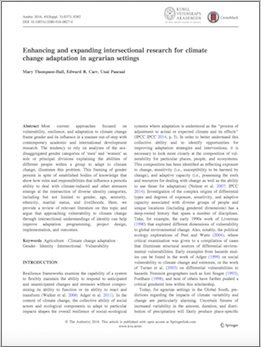Most current approaches focused on vulnerability, resilience, and adaptation to climate change frame gender and its influence in a manner out-of-step with contemporary academic and international development research. The tendency to rely on analyses of the sex-disaggregated gender categories of ‘men’ and ‘women’ as sole or principal divisions explaining the abilities of different people within a group to adapt to climate change, illustrates this problem. This framing of gender persists in spite of established bodies of knowledge that show how roles and responsibilities that influence a person´s ability to deal with climate-induced and other stressors emerge at the intersection of diverse identity categories, including but not limited to gender, age, seniority, ethnicity, marital status, and livelihoods. This article provides a review of relevant literature on this topic and argues that approaching vulnerability to climate change through intersectional understandings of identity can help improve adaptation programming, project design, implementation, and outcomes.
Enhancing and expanding intersectional research for climate change adaptation in agrarian settings



